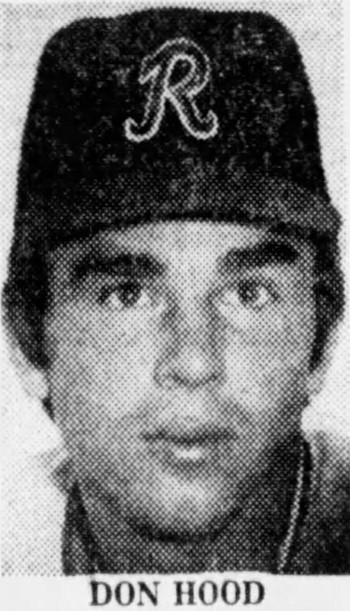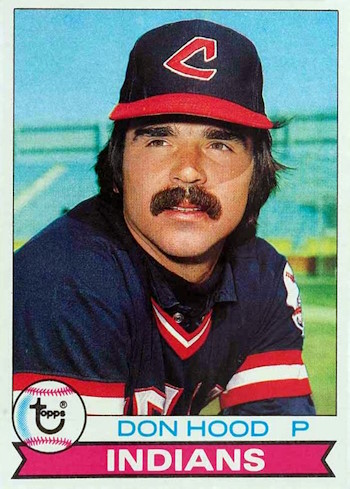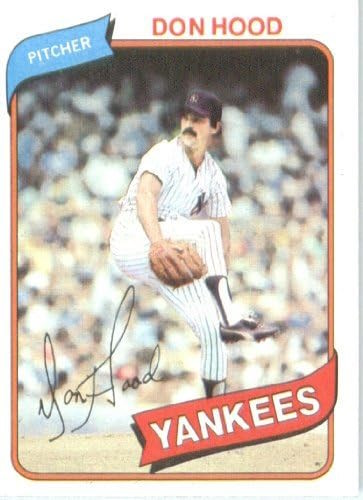RIP to pitcher Don Hood, a former first-round draft pack who went on to have a 10-year career in the majors. He died on June 10 at the age of 73. Hood pitched for the Baltimore Orioles (1973-74), Cleveland Indians (1975-79), New York Yankees (1979), St. Louis Cardinals (1980) and Kansas City Royals (1982-83).
Donald Harris Hood was born in Florence, S.C., on October 16, 1949. Hood’s initial passion in life was music — he didn’t play an instrument, but he constantly listened to music, and he actually raised some eyebrows as a professional pitcher by toting around an early portable radio/cassette players. “I didn’t have a father when I grew up,” Hood told Baltimore’s Evening Sun in a 1973 interview. “My mother raised me and two stepsisters. I had no one to show me certain things and you know how a kid searches for things at different ages. I turned to music. I used to listen to it three, four hours at a time. The writer of the music is often telling you something that happened in his life. Maybe you find that you have something in common with him.”
As he got older, Hood also turned to sports. He played many of them, but baseball was the one that really stood out. The young left-hander occasionally had control problems but quickly established himself as one of Southside High School’s best pitchers. He struck out 19 batters in a no-hitter against Batesburg Leesville during a 1967 playoff series. He tossed a couple of no-nos as a junior and struck out 131 batters over 69 innings. Overall, Hood compiled a 28-1 pitching record in high school. Throw in his time as a basketball player and the quarterback of the Southside football team, Hood played on four state championship teams.

Hood was picked by the Baltimore Orioles in the First Round of the 1969 June Amateur Draft. “Naturally we are glad to get him because he is a left-hander and our organization needs left-handers,” said scout Ray Scarborough. “I think we have one of the best in Don.” Hood lived up to that promise. He started his pro career in Bluefield of the Rookie-Level Appalachian League later that year and was 5-1 in 9 starts. In 1970, he won 10 games (and lost 10) for Stockton with a fine 2.88 ERA and 13 complete games. He was leading the league in ERA before suffering a late-season slump, but he still struck out 196 batters in 178 innings. He didn’t reach that strikeout rate again in his career, but he pitched well and continued to advance in the minors. After winning 11 games for Double-A Dallas-Fort Worth in 1971, Hood was promoted up to the Triple-A Rochester Red Wings the following year. He went 9-10 for the Red Wings in 1972, with a 3.48 ERA. His 1 shutout on the season was a 1-hitter against Toledo on June 28.
Hood pitched very well in spring training of 1973 for the Orioles but was sent back to Rochester until mid-July. He debuted in the major leagues in Oakland on July 16 after starter Doyle Alexander was placed on the disabled list. He came on in relief of starter Jesse Jefferson, a rookie pitcher who had competed with Hood for a roster spot. With the A’s ahead 5-4, Hood started the bottom of the sixth inning. He allowed 2 hits and no runs over 4 innings and struck out 3 Oakland batters. Meanwhile, Brooks Robinson hit a grand slam to put the Orioles out in front. Baltimore won 7-5, and Hood picked up the win in his first major-league game.
Unfortunately for Hood, Baltimore had a strong pitching staff. Starters included Jim Palmer, Mike Cuellar, Dave McNally and Alexander. The bullpen had great seasons from Bob Reynolds and Grant Jackson, and Eddie Watt pitched regularly before he was traded. Hood made a total of 8 appearances from mid-July to the end of the season, sometimes going weeks or almost a month between appearances. Hood was rusty when he pitched due to infrequent use, and he didn’t last long when he was given a chance to start a game. With an ERA well over 5, Hood was given the chance to start against the Detroit Tigers on September 26. He efficiently shut down Detroit 4-0, in a game that lasted just over 2 hours. He fanned 5 batters and allowed only 2 hits, to Willie Horton and Tony Taylor. “I figured if he gave us five innings, it would be a great job,” said Orioles manager Earl Weaver. “It was a tough assignment, especially facing all those righthanders.”
The shutout gave Hood a 3-2 record with 1 save over 8 games. He struck out 18 and walked 6 in 32-1/3 innings. He earned a spot on Baltimore’s postseason roster, but the only playoff appearance Hood ever made in his career came as a pinch-runner during the 1973 AL Championship Series. He replaced Robinson in Game Two after the third baseman had hit an RBI single off Oakland’s Rollie Fingers, advanced to second on a Bobby Grich walk and was stranded when Don Baylor grounded out. Baltimore lost that game and the series to the A’s.
Hood’s 1974 season was marked by tragedy. He witnessed Orioles prospect Mark Weems drown in Venezuela after they and several other teammates went swimming on January 1, on a break from winter ball. His own mother, Betty, died in May after drowning in a creek behind the family home in Florence. Hood took time away from the Orioles to deal with the loss, but he also pitched sparingly when he was available. Hood appeared in just 20 games, all but 2 of which came in relief, and had a 1-1 record and 1 save with a 3.45 ERA. The Orioles again lost to Oakland in the ALCS, and Hood didn’t even get a pinch-running role. He was given a chance for more major-league action when he was traded to Cleveland, along with Boog Powell, in February of 1975 for catcher Dave Duncan and a minor-leaguer. Both Powell and Hood had disagreed with Weaver in the past and were glad for new opportunities. Cleveland manager Frank Robinson said that Hood would get a chance to start with the team. “He has the credentials but with the Baltimore pitching staff he didn’t have the chance… I believe that given this chance he’ll develop into a fine major-league pitcher.”
Hood found regular work on the Cleveland pitching staff for 4-plus seasons. He was a true swingman. In 1975 and 1978, he started a career-high 19 times. On the other hand, he was primarily a reliever in 1976 and ’77. In his first season with Cleveland, he began the year in the starting rotation, was removed to the bullpen after some poor starts, and regained his starting role by the end of the year. He finished with a 6-10 record in 19 starts and 10 relief appearances. He had a poor year in 1976, as his ERA rose to 4.87. By the time the spring of 1977 came around, Hood had been through the wringer, emotionally. He had witnessed death first-hand, he had lost his mother, who was his sole parent and chief supporter. His marriage had ended, and he had gained custody of his daughter. He also came to camp with a new relationship with God and a new acceptance of his role with Cleveland.

Hood had been brought up in the church, but he fell away from it as his baseball career began. As he gained custody of his daughter, Rhea, he began reading the Bible more often. “I wanted to do something to make my life more presentable to her,” he said. He also came to terms with the fact that he might not be a regular starter in the majors. “We’re grown men playing kids’ games, and sometimes we act like kids,” Hood added. “If I get a chance to start, that’s what I’ve always wanted; it’d be great. But now I just want to do my job whatever it is, whether it’s long relief or spot starting.”
Perhaps the change in attitude led to Hood’s best season, as he had an excellent 3.00 ERA and a 132 ERA+ for the Indians in 1977. He also had a 2-1 record in 51 games, which included 5 starts. He then logged a career-best 154-2/3 innings as a swingman in 1978, with 19 starts and 17 relief appearances. He won 5 games and lost 6 while also reaching a career high with 77 strikeouts. Hood began 1979 with Cleveland and pitched in 13 games, winning 1 and saving 1. He walked an uncharacteristically high 14 batters in 22 innings, but the New York Yankees wanted him in their bullpen regardless. Hood was traded to New York on June 15 in exchange for Cliff Johnson. He picked up the win in both his last Cleveland appearance and his first New York appearance, throwing 4-2/3 scoreless innings against Toronto in his Yankees debut. Hood proved to be a very solid pitcher for the Yankees, making 6 starts in his 27 appearances and ending the year with a 3-1 record and 3.07 ERA while wearing Yankees pinstripes. After the season ended, Hood was part of a group of players granted free agency, though it was not the conventional free agency of today. He was “drafted” by multiple teams, and those teams, and only those teams, could negotiate with him. Hood was picked by 9 teams and ultimately signed with the St. Louis Cardinals after a couple rounds of picks. He would have signed with Athletics, with the assumption that the team was moving to Denver, but the deal fell through when the team decided to stay in Oakland.
St. Louis’s weakness was in its bullpen, and the team acquired Hood and Donnie Moore to help preserve the lead in late innings. Hood’s debut with St. Louis was pretty inauspicious. He entered the top of the ninth inning of the game on April 11, 1980, with the Cardinals clinging to a 3-2 lead against Pittsburgh. Dave Parker hit a ground ball to shortstop Garry Templeton, but the throw drew first baseman Keith Hernandez off the bag for an error. Hood then walked Willie Stargell and was immediately replaced by Mark Littell. Littell retired two batters but gave up a single to Ed Ott, allowing the tying and go-ahead runs to score. Hood’s first game for St. Louis resulted in a 4-3 loss. His season improved from there, as he worked as a spot starter, long reliever and short reliever over the course of the season. He turned in a 4-6 record in 33 games, with a 3.39 ERA, but the Cardinals still released him after the season. He did, however, achieve a bonus by appearing in 35 games, including 2 games as a pinch-runner. Going down to the final game of the season, Hood had appeared in 34 games, one shy of the bonus. Whitey Herzog, Cardinals general manager, said that he hadn’t told manager Red Schoendienst about the clause. “I didn’t want to deprive the guy. I figured if Red needed him, he should pitch him,” Herzog later related. “Red put him in as a pinch-runner. It cost us $10,000.”

The Kansas City Royals signed Hood to a minor-league contract, and he spent all of 1981 pitching for their Triple-A affiliate in Omaha. If the 31-year-old pitcher ever got upset about his situation, he recalled the words of wisdom from his Cardinals teammate Jim Kaat. “He just told me that you should be grateful for being alive, playing a game you love. That made being sent down easier to accept,” he said. The Royals brought Hood to the majors for parts of both 1982 and 1983. When he joined Kansas City in 1982, he won 4 games without a defeat and had an ERA of 3.51. He missed time in 1983 due to an ankle injury, but Hood often found himself on the bench for long stretches. He was effective when he pitched, with a 2.27 ERA in 27 games. However, Royals manager Dick Howser used Hood as the 10th pitcher on a 10-man pitching staff, so the left-hander didn’t pitch as often as he would have liked. Hood and Howser got into an altercation in the middle of June, when Hood got too boisterous on a late-night bus trip and got shoved by his manager. It took several coaches and players to separate the two, and Hood was fined for his outburst. He returned to the Royals for spring training in 1984 but was waived at the end of March. The move marked the end of Hood’s career.
Hood pitched in the majors for parts of 10 seasons and had a 34-35 record with 6 saves. He made 297 appearances, including 72 starts, and he completed 6 games with 1 career shutout. Hood’s career ERA was 3.79, and his ERA+ was 101. He struck out 374 batters and walked 364, and opposing batters hit .263 against him. Hood was used as a pinch-runner 15 times in the regular season during his career, and he scored 5 runs. He also had 4 hits with St. Louis during his one season in the National League. His first major-league hit came on May 18, 1980; it was an infield single against San Francisco’s Bob Knepper. He drove in his only career run on August 30, 1980 with an RBI single against Atlanta’s Larry McWilliams. Hood had an even .200 batting average in 20 at-bats. Baseball Reference credits him with 5.3 Wins Above Replacement.
Hood pitched for the Fort Myers Sun Sox in the Senior League when that league attempted to get off the ground. According to his family-placed obituary, he also worked as a park ranger in Lee County, Fla., following his time in baseball.
For more information: Waters-Powell Funeral Home
Follow me on Instagram: @rip_mlb
Follow me on Facebook: ripbaseball
Follow me on Bluesky: @ripmlb
Follow me on Threads: @rip_mlb
Follow me on X: @rip_mlb
Support RIP Baseball




Don Hood casi pierde la vida en 1974 al tratar de salvar a su compañero de equipo en Magallanes en Venezuela cuando Mark Weems murió ahogado…Don trato infructuosamente de salvarlo y el mismo casi se ahogó también
LikeLike